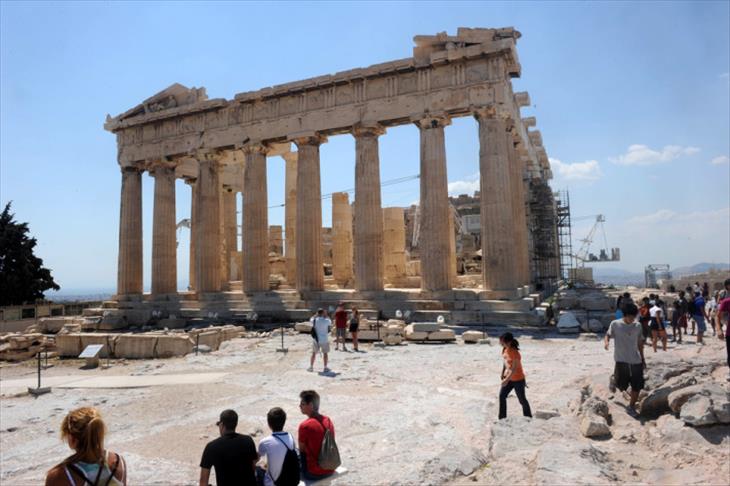Greece eyes Ukraine role with Black Sea organization
Athens is expected to contribute to enhancing regional cooperation during its six-month leadership of the Organization of the Black Sea Economic Cooperation.

By A. Humeyra Atilgan
ISTANBUL
Greece can bring its European Union membership role to bear in regional mediation role over the Ukraine crisis during its new six-month leadership of the BSEC Organization of the Black Sea Economic Cooperation – but it needs to develop stronger ties with Turkey.
This was the verdict of at least one analyst speaking to Anadolu Agency in the wake of this month’s announcement that Athens would chair the regional body until early 2015.
"Greece, as an EU member state, can make the organization have a more active role in minimizing instability in the Black Sea region," said Mehmet Seyfettin Erol, an academic from Turkey’s Gazi University and the head of USGAM Center for International Strategy and Security Studies.
As unrest grew in eastern Ukraine in February 2014, after Russia annexed Crimea, stability in the region has turned out to be the most critical issue for most international organizations, especially those aimed at fostering harmony in the Black Sea region.
Earlier this month, Greece assumed the rotating chair of the BSEC body, during which it will implement a number of events expected to contribute to enhancing regional cooperation.
Greek ambassador Michael Christidis, told reporters in Istanbul last week that the work of the organization could be helpful in serving as a “window of hope” to find solutions regional problems.
However, pointing to the Ukraine crisis, Christidis said stability in the Black Sea region was beyond the competence of the organization, adding “there is no doubt that the economic cooperation among the member countries will help promote policies of understanding of the exchange of views.
“In that sense, it can very much enhance stability in the region along with development, which is the main aim of our organization," he said.
Established in 1992, the 12-member group, which includes Russia, Turkey and Ukraine, is believed to have the potential to boost Black Sea regional cooperation despite existing differences among BSEC member-states.
Turkish academic Erol voiced his belief that the organization has not done what was necessary for the solution of Ukraine crisis. He stressed the need for member countries to reach consensus on mutual benefits in order to establish a role for mediation in Ukraine issue.
"Considering that Greece is an EU member state and also has a strong historical relationship with Russia, the country has both some advantages and difficulties in taking an active role over Ukraine crisis," he said.
Erol claims the difficulty for the Greek role is that it needs to very cautiously take into account the benefits of EU foreign policy when deciding on a balance between the West and Russia.
European leaders both from the EU and U.S. decided to impose sanctions on Russian officials as a response to the crisis in Ukraine. Sanctions came following diplomatic confrontation between Russia and the West over the situation in Ukraine, with Western countries blaming Moscow for the conflict.
The EU has for long resisted calls to develop a regional approach towards the Black Sea and to actively participate in the Black Sea Economic Cooperation organization, says Professor Mustafa Aydin, rector at Kadir Has University.
Writing as far back of 2005 in "Europe’s new region: The Black Sea in the wider Europe neighbourhood" Aydin added: "The Black Sea, situated at the crossroads between Europe and Asia as well as Russia and the Middle East, is more than a region of local strategic significance, representing an axis of increasing geo‐political importance to the EU.”
BSEC itself has championed Greece’s dual membership: "The Hellenic Republic, as an EU and BSEC Member State, will continue the efforts to enhance cooperation with the EU," the BSC has said in a recent statement.
"It is our firm belief that BSEC – EU interaction can and should evolve into a mutually advantageous relationship that will bring tangible results to the wider Black Sea area."
Another difficulty for Greece might be its tarnished image as the country has gone through five years of deep recession although Ambassador Christidis claimed the country’s financial catastrophe will not have any impact on the functioning of the organization or related bodies.
Despite this claim, analysts remain wary of Athens’ parlous finances. Gazi University’s Erol concludes that Greece needs to “overcome the crisis in itself” and develop strong regional cooperation with its neighbor Turkey in order to have a successful mediation role in Ukraine.
Anadolu Agency website contains only a portion of the news stories offered to subscribers in the AA News Broadcasting System (HAS), and in summarized form. Please contact us for subscription options.

